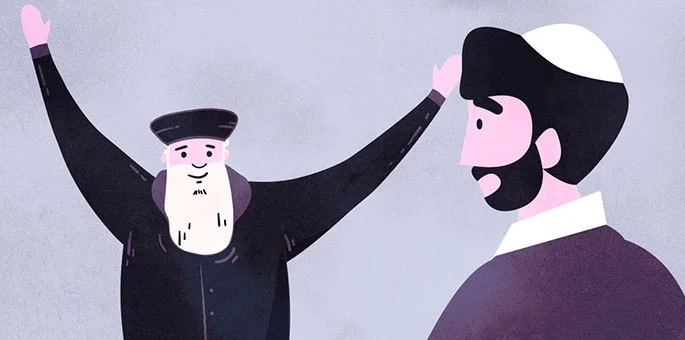I was nearing the end of my studies at the kollel, a yeshiva for young married men, and I wanted to become the Rebbe’s emissary. I was told of several places that needed an emissary, and in 1983 I wrote to the Rebbe mentioning them. One offer came from another country whose language I did not speak. The Rebbe wrote, “Then this is not for you.” Of another, rather vague offer, he wrote, “What does this mean in practice?”
In his answer, the Rebbe explained to me the general principles of finding work as an emissary: when choosing an occupation, one must first understand what one is good at, what one is capable of, and what offer seems realistic and practical. Since I mentioned all the offers that had come up, which were very different from each other, the Rebbe added: “Is the same person good for all these completely different jobs?”
In the end he said that I should think carefully about the remaining offers, as well as those that might appear in the future, and then ask him again. And so I spent the next few weeks thinking, not knowing what to decide on.
A few years earlier, in 1980, the Rebbe had launched a campaign to help retirees. In fact, according to the Rebbe, it is forbidden to stop being active. That is, there is no such thing as retiring. A person may no longer be able to go to work every day, but as long as he is alive, as long as the Almighty gives him strength, he must do what G-d wants.
And so the Rebbe called on all who had reached this stage in their lives to register for a kollel, to spend their golden years in Torah study. Addressing the Hasidim on the 20th of Av, the anniversary of the death of his father, Rav Levi Yitzchak, the Rebbe proposed that these new kollels for the elderly be run like a regular kollel: with stipends for their members, scheduled classes by local rabbis, and so on.
The Rebbe called these kollels “Tiferes Zkeinim” (“The Splendor of the Elderly”) and asked those who would organize them to add his father’s name to their name. For each new kollel, he promised to donate $18, and for those named “Kollel Tiferes Zkeinim Levi Yitzchok” in his father’s memory, $100. He also mentioned that many nursing homes and senior centers are looking for ways to keep their clients occupied, and it would be a good idea to offer Torah lessons there.
The Rebbe continued to talk about this in his subsequent speeches, and Tiferes Zekeinim programs were organized in various communities. However, one day the Rebbe said, “It has been several months and no one has taken up this project on a permanent basis.” So a committee of enthusiasts assembled in New York and hired a full-time person to organize Torah classes in local nursing homes and senior centers. These classes multiplied and their attendance grew over the next two years, until the committee had to look for a new candidate for the job. I was looking for a place where I could become the Rebbe’s emissary, and I wrote to him about the offer. I received an immediate response: “Blessings and success!” And so I began working at Kollel Tiferes Zekeinim Levi Yitzchok.
After a year, we had conducted about fifty weekly Torah lessons in various senior centers and nursing homes. And we decided to invite all participants to a general meeting.
We arranged to hold the meeting at Chabad headquarters, 770 Eastern Parkway, during afternoon prayers and to give our senior students the opportunity to see the Rebbe. We hoped that the Rebbe would address them, although we were not sure. When the Rebbe entered the synagogue, he waved to them, and after the prayers, to our delight, he addressed them.
From then on we held such gatherings twice a year: once around the 20th of Av and once during Chanukah. During Chanukah the Rebbe always spoke at our gatherings, but during the summer gatherings he addressed us only twice. But in any case, whether he spoke or not, he always gave me a wad of dollar bills to distribute to each participant in the gathering as a token of the Rebbe’s participation in our gathering.
In 1985, in his response to an invitation to our Chanukah convention, the Rebbe suggested that we coordinate our event so that “all groups would come together” and that “if necessary, this would be done through the mediation of the Chabad rabbis.” At first, I didn’t understand what this meant. Were some other organizations I didn’t know about planning to bring seniors to 770? But as Chanukah approached, we realized that the Rebbe was not referring to other senior groups, but to organizing a children’s gathering. He was asking us to combine the two conventions!
We set a date for the joint convention, and the night before, Yaakov Yehuda Hecht, who always chaired the children’s conventions, came to 770 to discuss who would sit where. Hundreds of children were expected, and when Rabbi Hecht showed where they would sit, I realized that there was no room for the elderly.
But the Rebbe had already hinted that negotiations might be necessary, and I approached several Chabad rabbis who proposed a compromise solution. But the Rebbe did not like this solution. He wanted everyone in the synagogue at the same time – children and old people. And so it was done. We squeezed benches into every available corner 770, and when the buses arrived, we seated the old people among the little children. They were delighted! And then the Rebbe addressed the congregation. And he said that when children and old people all sit together and listen to the words of the Torah, this represents true unity.
The following year, on the morning of the day when our summer convention was planned, the Rebbe’s secretary, Leibel Groner, called me and said that the Rebbe wanted to see me. This took me completely by surprise, but I immediately prepared myself and went to his office.
The Rebbe said that he was going to go to the Ohel that day and pray for the elderly Jews there. He gave many blessings and instructed me to relay them verbatim to the participants of the convention, and then gave me a wad of 600 one-dollar bills to distribute that evening.
I was completely stunned, and when I left the office, I realized that I could not repeat from memory all of the Rebbe’s blessings. Fortunately, during the audience, Leibel Groner left the door open. Together we wrote down everything we remembered, and then Rabbi Groner brought our notes to the Rebbe. The Rebbe immediately made corrections and additions to them. And at our meeting, I read all of these blessings, which mentioned the participants of the convention themselves, and their children and grandchildren.
Translation by Yakov Khanin




